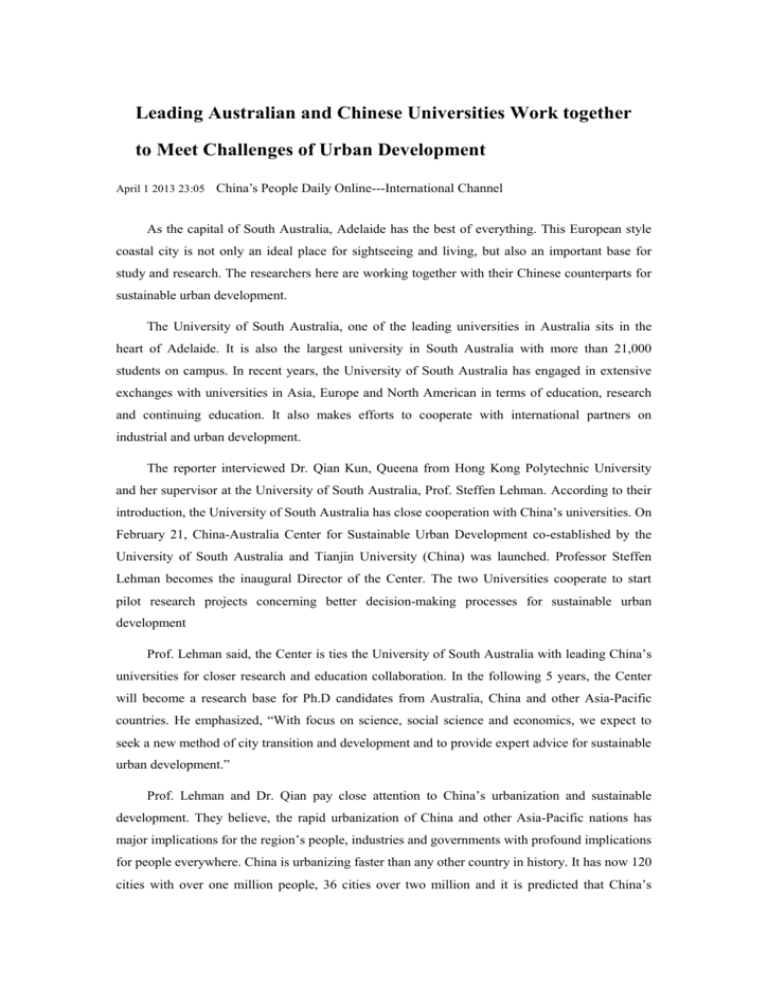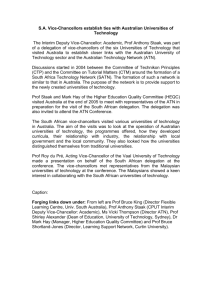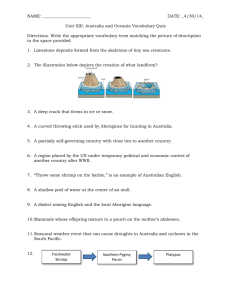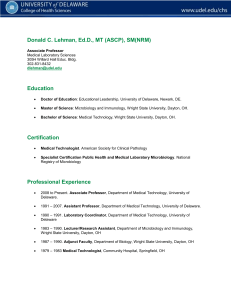English translation - University of South Australia
advertisement

Leading Australian and Chinese Universities Work together to Meet Challenges of Urban Development April 1 2013 23:05 China’s People Daily Online---International Channel As the capital of South Australia, Adelaide has the best of everything. This European style coastal city is not only an ideal place for sightseeing and living, but also an important base for study and research. The researchers here are working together with their Chinese counterparts for sustainable urban development. The University of South Australia, one of the leading universities in Australia sits in the heart of Adelaide. It is also the largest university in South Australia with more than 21,000 students on campus. In recent years, the University of South Australia has engaged in extensive exchanges with universities in Asia, Europe and North American in terms of education, research and continuing education. It also makes efforts to cooperate with international partners on industrial and urban development. The reporter interviewed Dr. Qian Kun, Queena from Hong Kong Polytechnic University and her supervisor at the University of South Australia, Prof. Steffen Lehman. According to their introduction, the University of South Australia has close cooperation with China’s universities. On February 21, China-Australia Center for Sustainable Urban Development co-established by the University of South Australia and Tianjin University (China) was launched. Professor Steffen Lehman becomes the inaugural Director of the Center. The two Universities cooperate to start pilot research projects concerning better decision-making processes for sustainable urban development Prof. Lehman said, the Center is ties the University of South Australia with leading China’s universities for closer research and education collaboration. In the following 5 years, the Center will become a research base for Ph.D candidates from Australia, China and other Asia-Pacific countries. He emphasized, “With focus on science, social science and economics, we expect to seek a new method of city transition and development and to provide expert advice for sustainable urban development.” Prof. Lehman and Dr. Qian pay close attention to China’s urbanization and sustainable development. They believe, the rapid urbanization of China and other Asia-Pacific nations has major implications for the region’s people, industries and governments with profound implications for people everywhere. China is urbanizing faster than any other country in history. It has now 120 cities with over one million people, 36 cities over two million and it is predicted that China’s urban population will be one billion by 2030. China also has more researchers than any other country and partnerships with research and technology communities are crucial to Australia’s ability to access new ideas and to build our future competitiveness. The sheer scale of opportunities for researchers interested in working on urbanization in China is itself a challenge. In the last 20 years, China’s urban boom became synonymous with traumatic individual experiences, of poor farmers leaving the countryside for cities with better job opportunities, air-conditioned flats, private cars and supermarkets full of goods; but ending up as a new urban underclass. There is an increasing awareness of socio-economic inequity and the need to base the economy on innovation and knowledge rather than on cheap labour and environmental exploitation. Now that the need to protect agricultural land is acknowledged, urbanisation models have started to move away from Western sprawl concepts. China is seeking advice on more environmentally sustainable ways to support the transformation of their cities, to resolve the serious challenges caused by their too rapid urbanisation. Chinese cities will need to be kept dynamic, inclusive, complex and vibrant, but also healthy and resilient, ensuring the wellbeing of their citizens, democratic participation processes for their residents and sustainable flows; these flows need to go beyond flows of data and money to include the sustainable flow of resources, materials, energy, transport, water, biodiversity, nutrients and food – cycling energy and material (waste) flows. This goes far beyond the conventional thinking of aesthetics and functional city form; it is about the longer-term sustainability of urban settlements. Instead of becoming more unsustainable, existing cities will need to be transformed in an intelligent way, district by district, towards low carbon urban precincts. In this way we can increase the resilience and durability of cities against environmental factors such as rising temperatures, heat stress and other extreme weather events, such as urban flooding. Prof. Lehman and Dr. Qian believe that, the solution for the Chinese government to balance the competitiveness of low carbon economy development and the transition of its rapid urbanization lies in a proactive attitude and efforts with its international partners on collaborative research issues such as sustainability, urban environment. The integrated research areas operate at different scales and ensure the participation of the industry and government partners. The practical and social impact of the research outputs will provide valuable reference for Chinese cities in the urbanization transformation in regard of green sustainability.









